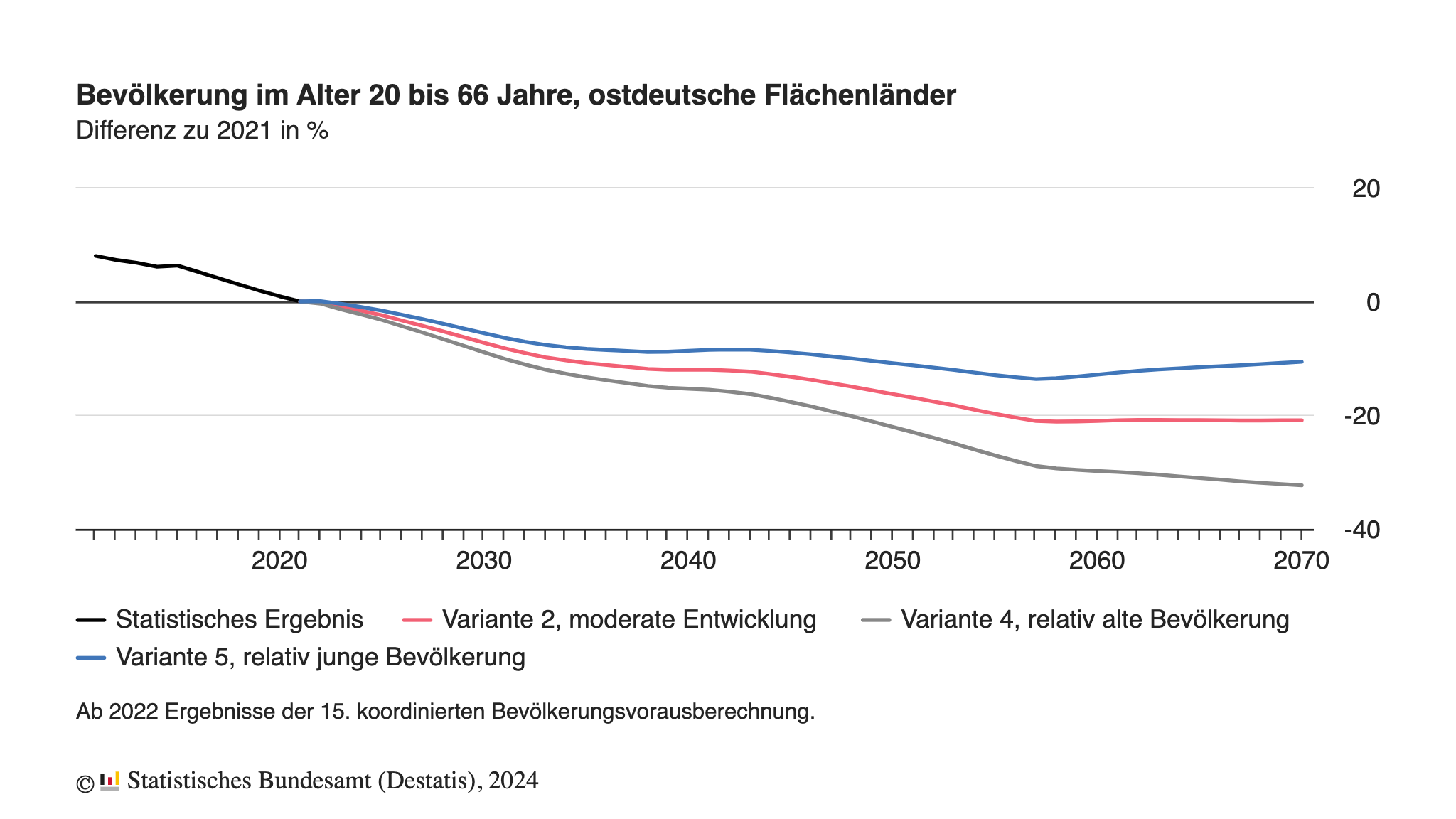
Demographic change is already having a major impact on Germany’s corporate landscape. An ageing workforce, the loss of expert knowledge and a changing labor market present companies with a variety of challenges. However, these changes also offer the opportunity to make your company future-proof and resilient.
In this article, we take an in-depth look at demographic change and the resulting challenges, particularly with regard to the impending retirement of the boomer generation. We will show you practical solutions for mastering these challenges and at the same time safeguarding valuable knowledge in the long term.
Demographic change in Germany, characterized by an ageing population and a declining birth rate, has far-reaching effects on the labour market. The Federal Statistical Office provides alarming data on this. With an increasing number of older skilled workers retiring and a smaller proportion of younger workers, the labor market is increasingly challenged.

The changing age structure is not only leading to a shortage of skilled workers in certain sectors and regions, but also to increased competition for qualified employees. Strategies need to be developed to successfully counteract the challenges of an ageing workforce and the impending shortage of skilled workers.
The boomer generation has accumulated valuable expertise and a wealth of experience over decades, which is often undocumented and at risk of being lost when they retire. This loss of knowledge can have serious consequences for companies, as it is difficult to replace the specific know-how and practical experience of these employees.
There is also a risk that companies will lose their innovative capacity and competitiveness due to the loss of knowledge. New employees often have to familiarize themselves with their roles and need time to develop the same level of expertise, which can affect efficiency and productivity.
The impending loss of knowledge as boomers retire is therefore one of the biggest challenges for companies in the context of demographic change. Strategies need to be developed to preserve this valuable knowledge and make the transition to an era without boomers seamless.

Knowledge management encompasses the systematic acquisition, transfer and use of knowledge within an organization and promotes a culture of lifelong learning and knowledge sharing. It plays a decisive role, particularly in the course of demographic change, by safeguarding the know-how of departing employees and thus ensuring continuity within the company.
By establishing effective knowledge management structures, companies can make the transition between experienced workers and new talent seamless and preserve valuable expertise for the future.
Effective strategies enable companies to meet the challenges of demographic change, in particular by safeguarding and transferring valuable knowledge. Practice-oriented solutions help to retain expertise within a company in the long term. In response to these challenges, we recommend the following measures
By consistently implementing these strategies, companies can ensure that they have the necessary expertise to remain successful and continue to develop, even in times of demographic change.

In order to meet the challenges of demographic change, a fundamental change in the way companies manage and transfer knowledge is inevitable.
The study “Knowledge Transfer in Companies 2023”, conducted by the Haufe Group, offers valuable insights into current trends and challenges in the field of knowledge management. It emphasizes the central role of digital strategies and technologies in effectively countering the changes caused by demographic change.
It is obvious that digital change plays a key role. Currently, less than 30% of companies use digital methods for knowledge transfer. However, this gap in the level of digitalization offers a unique opportunity to increase efficiency and productivity through the use of modern technologies.
The introduction of digital tools and platforms not only enables a more structured and effective transfer of knowledge, but also strengthens the innovative power and competitiveness of companies in the face of demographic change.
The importance of structured knowledge transfer cannot be overemphasized, especially against the backdrop of demographic change. The “Knowledge Transfer in Companies 2023” study provides impressive evidence of the superiority of structured methods over ad-hoc approaches.
These findings underline the need to invest in systematic processes and the associated technologies in order to optimize knowledge transfer and secure a competitive edge for companies.
The dynamics of demographic change pose both challenges and new opportunities for companies. The “Knowledge transfer in companies 2023” study shows where there is a need for action and what opportunities are available.
Overcoming these challenges and exploiting the aforementioned potential requires a targeted strategy that encompasses both the technological infrastructure and the corporate culture.
In view of the challenges and opportunities outlined above, we recognize the need for robust digital support for companies to manage demographic change efficiently. Our platform is specifically designed to meet the special requirements of knowledge management and position-related employee onboarding
With our great2know platform, we enable a smooth transition from the knowledge documentation of departing employees to the induction of new team members. The ability to record and structure the knowledge of departing employees makes the onboarding process much more efficient Information that was previously only available in the heads of individual employees is systematically recorded by us and made accessible to new employees. In this way, we ensure that less knowledge is lost and a digital corporate memory is built up. This not only contributes to the stability of your company, but also promotes innovation and competitiveness on the market.

By introducing our platform into your company, you will benefit from numerous advantages that increase both internal efficiency and employee satisfaction:
With our support, you can position your company at the forefront of digital transformation, ready to proactively tackle the challenges and opportunities of demographic change. Our solution is not just about overcoming today’s problems, but also an investment in the future viability and long-term success of your company.

In order to successfully master demographic change, companies must not only adapt their way of thinking, but also be prepared to invest in forward-looking solutions such as great2know. Effective knowledge management and the digitalization of off- and onboarding are not just strategies to minimize risk; they also open up opportunities to tap into new potential.
Adapting to the changing workforce structure and safeguarding in-house knowledge are decisive steps in successfully mastering the challenges of demographic change and strengthening competitiveness at the same time.
Companies that see this change as an opportunity to future-proof their organization will benefit in the long term from a more resilient, agile and innovative corporate culture.
However, through the targeted use of digital tools, companies can not only overcome immediate challenges, but also create a basis for continuous growth and innovation. By redefining the way knowledge is shared, preserved and used, we can create a living, learning organization that is ready to shape the future with confidence.
In this sense, demographic change is not only a challenge, but also an invitation to all companies to proactively shape the future. With the right strategies and tools, this change will become a source of strength and innovation. great2know is ready to accompany your company on this journey and ensure that you are well prepared for the challenges of tomorrow.